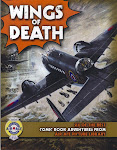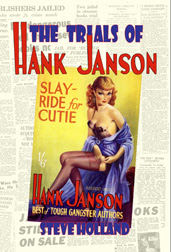Harris, born in Nottingham on 7 March 1957, was educated at Belvoir High School, Bottesford, and King Edward VII School, Melton Mowbray, where he edited the school magazine and wrote plays. He was inspired to become a writer at a very young age through visits to a local print works where his father worked. Harris. He studied English Literature at Selwyn College, Cambridge, where he edited the student newspaper Varsity.
He worked at the BBC on news and current affairs programmes such as Panorama and Newsnight before becoming political editor of The Observer in 1987. He has also written columns for the Sunday Times and Daily Telegraph.
Following the publication of his first non-fiction books (A Higher Form of Killing, with Jeremy Paxman, 1982; Gotcha: the Media, the Government and the Falklands Crisis, 1983; The Making of Neil Kinnock, 1984; Selling Hitler, 1986, and Good and Faithful Servant, 1990), he began producing novels and immediately hit on a winner.
Fatherland (1992) was an alternate-history thriller in which the Germans won the Second World War—a far from novel concept which dates back to within months of Hitler's death and was preceded in 1937-44 by dozens of speculative novels and stories in which Hitler's rise led to inevitable war/invasion/victory for Germany. (⇒ SFE 'Hitler Wins')
Enigma was the first of Harris's novels I read as it involved Bletchley Park and the Enigma machine, the histories of which I find fascinating. I then read his two "what if" novels, Fatherland and Archangel, the latter involving a search for Joseph Stalin's diary leads a British historian to discover the Soviet leader had a secret son.
The Ghost was another excellent thriller (Harris's first contemporary thriller, in fact), as was The Fear Index, which also has SF elements (an AI manipulating financial markets). I've not read his Roman historical novels, although that's simply down to a lack of time and too many other books.
His new novel, An Officer and a Spy, is another historical, but this one a little closer to home as it concerns the Dreyfus affair that divided France at the turn of the 20th century after an accusation of treason was leveled against a young army captain. Captain Alfred Dreyfus was sentenced to life imprisonment on Devil's Island. Harris has turned this scandal into a novel featuring real characters— his detective, if you like, is the real-life Colonel Georges Picquart, head of counter-espionage for France's Deuxième Bureau. He, too, was eventually taken to court, accused of forging documents that proved Dreyfus was innocent.
I'll say no more, although the deadline for spoilers is well past! Besides, I haven't read the book yet and it might turn out to be another alternate history in which Dreyfus is discovered to be... the opposite of what he was actually discovered to be.
Fatherland (London, Hutchinson, May 1992)
Arrow 0099-26381-5, Mar 1993.
----, May 1993 [diff. cover]
---- [18th imp.] n.d., 386pp, £5.99. Cover photo: Tony Stone
Arrow 0099-52789-8, Oct 2009, 400pp, £7.99.
Arrow 978-0099-57157-5, Apr 2012, 400pp, £7.99.
Enigma (London, Hutchinson, 1995; New York, Random House, 1995)
Arrow 978-0099-99200-4, May 1996, 464pp.
----, [22nd imp.] 2001
Arrow 0099-41688-3, 2001, 453pp, £5.99. Cover: still. Movie tie-in.
Arrow 978-0099-52792-3, Oct 2009, 464pp, £7.99.
Archangel (London, Hutchinson, Aug 1998)
Arrow 978-0088-28241-9, Oct 1999, 432pp.
----, [diff. cover].
Arrow 978-0099-49108-8, Mar 2005, 432pp. TV Tie-in.
Arrow 978-0099-52793-0, Oct 2009, 432pp, £7.99.
Pompeii (London, Hutchinson, 2003; New York, Random House, 2003)
Arrow 978-0091-79493-4, Aug 2004, 352pp.
Arrow 978-0099-28261-7, Sep 2004, 397pp, £6.99. Cover: unknown
Arrow 978-0099-52794-7, Oct 2009, 416pp, £7.99.
Imperium (London, Hutchinson, Sep 2006; New York, Simon & Schuster, Sep 2006)
Arrow 978-0091-79542-9, Dec 2006, 416pp.
Arrow 978-0099-40631-0, Sep 2007, 496pp, £6.99.
Arrow 978-0099-52766-4, Oct 2009, 496pp, £7.99.
The Ghost (London, Hutchinson, Sep 2007; New York, Simon & Schuster, 2007)
Arrow 978-0091-79624-2, Mar 2008, 320pp, £12.99.
Arrow 0099-52749-9, Jul 2008, £7.99.
Arrow 978-0099-52512-7, Mar 2010, 416pp, £7.99. Movie tie-in.
as The Ghost Writer, Arrow 978-0099-53852-3, 2010, 400pp. Movie tie-in (Export).
Lustrum (London, Hutchinson, Oct 2009)
Arrow 978-0099-40632-7, Sep 2010, 452pp, £7.99.
The Fear Index (London, Hutchinson, Sep 2011)
Arrow 978-0091-93697-6, Sep 2011, 464pp, £12.99.
Arrow 978-0099-55326-7, Jun 2012, 385pp, £7.99. Cover photo by Colin Thomas/Getty Images
----, [10th imp.] £7.99.
Arrow 978-0099-55327-4, 2012, 385pp, n/p. Cover as above.
Hutchinson 978-0091-95413-0, Feb 2014, 496pp, £13.99.
Arrow 978-0099-58088-1, May 2014, 611pp, £7.99. Cover design by Glenn O'Neill
Dictator (London, Hutchinson, 2015)
Arrow 978-1784-74197, 2016, 520pp, £7.99. Cover by Colin Thomas; design by Glenn O'Neill
Conclave (London, Hutchinson, 2016)
Arrow 978-1784-75183-8, 2017, 380pp, £7.99. Cover photos by Gabriel Bouys/Sean Rayford
Munich (2017)
Arrow 978-178475185-2, 2018
Penguin 978-178746799-6, 2022
The Second Sleep (2019)
Arrow 978-178746096-6, 2020, 414+11pp, £8.99. Cover design by Glenn O'Neill (photos by Getty Images/Alamy Images)
V2 (2020)
Arrow 978-178746098-0, 2021, 378pp, £9.99. Cover design by Glenn O'Neill (photos by Ullsteinbild/Topfoto / Getty Images / Colin Thomas)
Act of Oblivion (2022)
Penguin 978-152916032-1, (Jun) 2023, 556pp, £9.99. Cover design by Glenn O'Neill (photos by Getty Images / Colin Thomas)
Precipice (2024)
Non-Fiction
Gotcha! The Media, The Government and the Falklands Crisis
Faber and Faber 0571-13052-6, 1983, 158pp, £2.95. Cover design by Pentagram
Selling Hitler (London, Faber & Faber, 1986)
Arrow 978-0099-56234-4, 2009, 402pp, £7.99.
The Media Trilogy (omnibus) (London, Faber & Faber, 1994)
Faber and Faber 0571-17231-8, 1994, 873pp, £9.99. Cover by variouis
(* First posted 16 October 2011. This version is expanded and updated.)




























































































Pompeii was a brilliant book, as was The Ghost. The latter was a superb film although as usual with a filmic treatise of a novel, there were some significant changes from the book.
ReplyDeleteLove all of Harris's novels but his Roman sequence is the best. Can't wait for the follow up to Lustrum!
ReplyDeleteWell, I've got both Pompeii and Lustrum. Looks like I'm going to have to add them to my "to read soon" pile.
ReplyDeleteI'd echo the praise for his Roman books - definitely worth finding time for! (and 'Selling Hitler' was a real page-turner too; the fact that it's supposed to be based on real life only makes it more compulsive).
ReplyDeleteOne thing that does surprise me about your post, however, is the description of 'Archangel' as an "alternate history" novel. Of course there's a sense in which it's possible to see all fiction as a kind of alternate reality, but I don't remember anything about that book that makes the term seem particularly applicable. In fact I'd say 'The Ghost' comes much closer by imagining an alternate version of Tony Blair.
Phil,
ReplyDeleteArchangel isn't alternate history, as you say, but the basic plot has Stalin's (fictional) son at its centre and I kind of group the book in with Fatherland for its "What If..." premise. Which is a better description than what I actually said. Blame the late nights!
"another alternate history in which Dreyfus is discovered to be... the opposite of what he was actually discovered to be."
ReplyDeleteIt's an alarming aspect of early twentieth century anti-Semitism that there were attempts to do just that. A frightening example is G.K. Chesterton's The duel of Doctor Hirsch http://www.cse.dmu.ac.uk/~mward/gkc/books/Complete_Father_Brown/chapter15.html